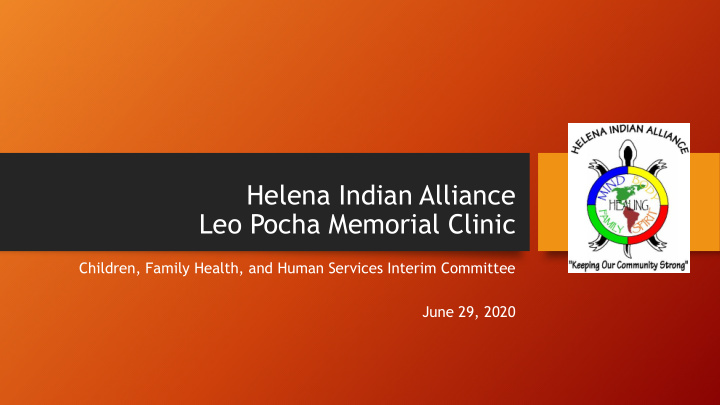



Helena Indian Alliance Leo Pocha Memorial Clinic Children, Family Health, and Human Services Interim Committee June 29, 2020
Mission Statement • The Helena Indian Alliance exists to advocate for and to responsibly serve the mental, physical, spiritual, and social welfare of the Native American population in the Helena community. • In addition to serving the Native American population we are open to all members of the public for our medical, mental health and community outreach programs.
What are Federally Qualified Health Centers (FQHC)? Federally qualified health centers include all organizations receiving grants under Section • 330 of the Public Health Service Act (PHS). FQHCs qualify for enhanced reimbursement from Medicare and Medicaid, as well as other benefits. FQHCs must serve an underserved area of population, offer a sliding fee scale, provide comprehensive services, have an ongoing quality assurance program, and have a governing board of directors.
Who we Are? • Three Family Nurse Practitioners that operate an outpatient clinic • Four additional Medical Assistants • Behavioral Health • Four full time Licensed Addictions Counselors (or candidates) • Three additional Mental Health or Co-Occurring counselors • Youth Program • Community Events
How do we work with Child and Family Services? • We offer a full level one outpatient substance abuse program. • Our local CFS office refers MANY clients here for assessment and treatment. • We offer Anger Management to combat domestic violence and aggressive behaviors in the home where children reside. • Our local office pays for this fee for service class in many cases. • We offer Parenting Classes that are free to the public • Most of our clients that take this class have CPS involvement. The counselor communicates directly to the caseworker upon completion of the class. • Case management for basic needs, re-entry groups for incarceration, Native Talking circle, medical care, Women’s specific support groups. • We utilize HIPAA compliant releases to work as a team with our local CFS office. • This could be for UA results, participation in treatment, anger management, ongoing safety concerns, etc.
• We have quarterly meetings with the CFS leadership to discuss intra-agency challenges, turnover in staff, collateral information, training opportunities, open dialogue about how either agency can adapt to better serve clients. • In the past we have hosted family engagement meetings here at our site so that clients would feel comfortable and supported. • We offer our services preventatively and also try and keep our wait times very short. • This assists in keeping families together as opposed to the trauma of removal. • We have many success stories of our agencies working together for families that resulted in reunification. • In many cases client’s kept their services long after they were required to.
Funding….. • As mentioned CFS has many times paid for fee for service clients that have an open treatment plan. In FY 2018 • • 91% of our clients utilized Medicaid/Medicaid expansion for services. Without that funding source this would result in a 96% loss in our revenues from health • coverages. 37% of utilization was American Indian • 63% of utilization was Non Native population • • Sliding Fee for services Grant Funding •
Recommend
More recommend